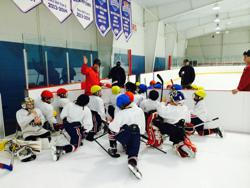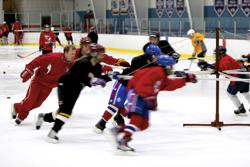21
March
Hockey & Snow, What a Difference a Year Can Make
Posted by Greg Carter

Last year here in Massachusetts Mother Nature delivered us more than 100 inches of snow. It was a winter to remember with record-breaking snowfall that seemed to find its way into our lives on a daily basis. And just when we dug out from one storm, another was on the way, dumping a dozen more back-breaking inches of snow on top of the sidewalks and driveways that we just got done clearing.
This year we are right around 25 inches of total snowfall, or roughly a quarter of the snowfall of only a year ago. As I was discussing this with someone at the rink the other day, the conversation turned to the hockey season last year, and like the weather, what a difference a year can make.
At this same point last year the guy I was talking with was in the midst of buying every shovel and ice scraper he could get his hands on. He even went out and purchased a brand new snow blower, one of those machines with enough horsepower to throw even the heaviest snow clear across to the other county. This year most of his new equipment has sat unused in his garage.
Just like the weather, the hockey season and player performance can dramatically change from year to year. One season a player may score goals like Jaromir Jagr, but the next have a dip in performance and struggle to find the back of the net.
It’s important to recognize that this is somewhat normal, and that development is a marathon, not a sprint. What players need to focus on is making sure they are preparing themselves not only for the great games and seasons, but also for the times when they need to go back to basics. Like my friend who went out and purchased all of the equipment to be prepared for snow, players should have the tools necessary to be prepared for hockey.
Mastering the fundamentals of hockey is a key ingredient to long term success. There is a belief held by many experts about the ‘10,000 Hour Rule’, which essentially says that 10,000 hours of practice to become world class in a field. If you are a serious hockey player you have probably heard about this, and are well on your way to finding the training and ice time that will help you master the skills necessary to take your game to the next level.
While it seems no one can accurately forecast the weather (sorry local weatherman), you can help forecast your hockey career. Whether it’s 100 inches of snow and 50 wins one season, or 25 inches and 12 wins the next, the big question is this: Are you going to be prepared?
We hope so, and have plenty of summer opportunities available for players of all ages and skill level. While we don’t have shovels and snow blowers to prepare you for next winter, we have coaches and trainers who know the game and are eager to teach. Thanks for reading and we look forward to seeing you this summer!







 Subscribe
Subscribe Subscribe
Subscribe




